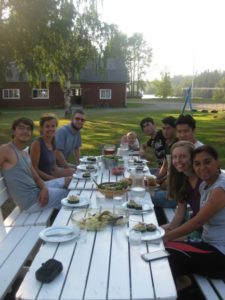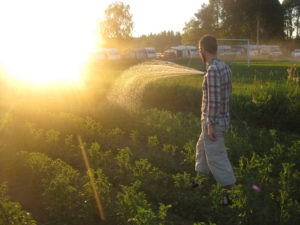At the Mustard Seed Community, we spend a lot of time gardening striving to live more sustainably, cooking food to share at our house meals and community meals, and sorting donations in the clothing closet to name just a few things. In other words, we do a lot of practical work with our hands which this life of discipleship in community quite simply requires. A lot of this work is mundane, everyday chores. It is work that doesn’t get much recognition. It’s not glorious or profound, but yet cooking food and doing the dishes are essential to life in community. In the Catholic Worker the saying goes, ”Everyone wants to join the revolution but nobody wants to do the dishes.” I think we are often tempted to rank and label certain work in the kingdom as more important than other work. Is preaching the sermon on Sunday morning more important than taking out the trash after the service? Both need to be done. Is hiding undocumented immigrants more important than street evangelism? 
The writer of Ecclesiastes reminds us that there is a time for everything. (Ecclesiastes 3:3-8) Likewise, there is also a time when we should be protesting on the streets the injustices of our society and there is a time when we should be doing the dishes. But all our work can be done in prayer as Brother Lawrence, the 17th century Carmelite monk, has taught us who said, ”The time of business does not with me differ from the time of prayer.”
And yet we must use our words. We must have a defense for this truth that we believe in. We cannot only do mercy. We must also preach peace. We must teach justice. We must pray for our enemies and we must make disciples. We are an evangelical movement in the most literal meaning of the word ’evangelical.’ We want the message and teachings of Jesus to be heard by many! And we want people and creation to be transformed through the life, death and resurrection of Jesus.
Evangelism has been a current topic of discussion in our little community. How do we evangelize? How do we make disciples? It is clear from scripture that we are called to make disciples but what does this discipling look like? Is every Christian called to the streets to meet the stranger with the gospel? Or are we each called to offer hospitality to the refugee? Or are we asking ourselves the wrong question? Maybe we should be asking instead: are we sowing the seeds of God’s truth and hope in the world? Are we cultivating and nurturing those seeds so that they will grow and mature and bear fruit?
As Archbishop Oscar Romero has taught us, we may never see the result of our work. ”We are workers, not master builders; ministers, not messiahs”. But we are called to be faithful. 
As I was discussing this with Samuel in our community recently he reminded me that this work of evangelizing or discipling (whichever you prefer calling it) is a lot like gardening. We are not only called to sow seeds. We are also called to prepare the soil, water and weed, and take care of the harvest. This living in community is one way we can create healthy soil for growth, as we work together and serve one another daily. But ultimately we leave the results of our work to the Master gardener. We are only the workers. As Paul wrote in 1 Corinthians 3:6-9, ”I planted, Apollos watered, but God made it grow. Because of this, neither the one who plants nor the one who waters is anything, but the only one who is anything is God who makes it grow. The one who plants and the one who waters work together, but each one will receive their own reward for their own labor. We are God’s coworkers, and you are God’s field, God’s building.”
Lord, may your kingdom grow in us.